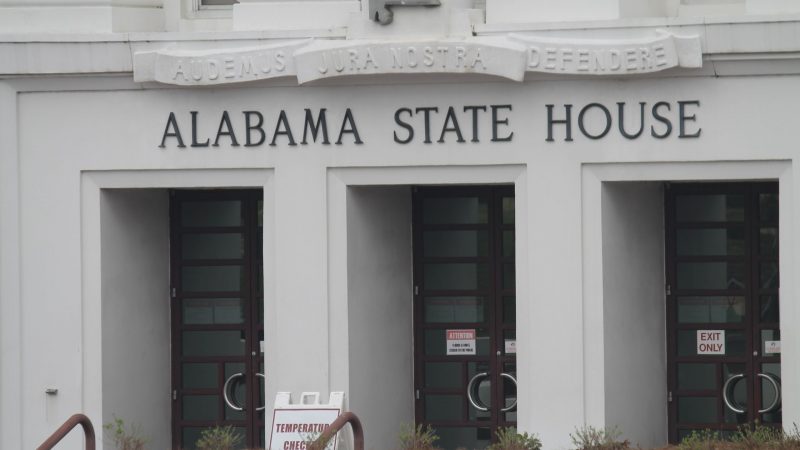2008 Constitutional Amendments
“So that in bad times, bad economic times like we have today, we can manage our
way out of a crisis without having the necessary start and stops of proration.”
Proration – across the board cuts because the state government’s funds come up short. French sponsored the legislation which led to Amendment One. It does two things. First, it increases the cap on how much the state can take from its education “rainy-day” fund from about $250 million to $437 million. It also establishes a “rainy-day” account for the general fund budget. French says Alabama used the education savings during the last economic downturn after 9-11.
“So that layoffs didn’t occur. So that UAB for instance could continue to recruit eminent scholars and scientists.”
Amendment One has the backing of many higher education officials, but not the support of Republican State Senator Scott Beason of Gardendale. He says legislators knew revenue would be short this year, so they passed a budget counting on having access to the savings, instead of making cuts.
“The only way the legislature is ever going to cut back on that spending, to be
more fiscally responsible, is if we cut off some of that money flow. And I think
this is simply enabling the government to continue to spend every dime it can get
its hands on.”
Beason also points out the savings generates revenue to support the general fund budget and other projects. So less money in the trust fund, less revenue. Opponents often use the phrase “raid the trust fund.” Steve French says it’s not a raid because the state has to pay the money back. But Scott Beason says that could compound the problem. The state would be obligated to pay back the trust fund, even during slow economic times when the budget would already be under stress.
“You may bypass a small train wreck this year to have a bigger train wreck next
year because you were not willing to cut the budgets responsibly.”
A train wreck waiting to happen or necessary tool? It’s up to the voters.
When you go to the polls tomorrow, you’re going to find a couple of other amendments on the ballot, amendments that affect only certain counties. Like Amendment Two. If that measure passes it would establish a Shelby County Judicial Commission and provide for filling circuit and district court vacancies in Shelby County. Amendment Four relates to Blount County and would prohibit any municipality that’s not wholly or at least partly in Blount County from annexing land in Blount County without voter approval.
In Jefferson County there’s a ballot measure that might catch your eye.
As Jefferson County’s sewer bond crisis continues to grab headlines, one constitutional amendment would change how some county residents pay for that sewer service. It’s for Jefferson County voters only, and would require that a tenant who uses the sewer be responsible for the bill, instead of the landlord picking up the tab. It’s an issue because Jefferson County can place liens on a landlord’s property if the tenant doesn’t pay. State Representative Pat Moore sponsored the measure and as a landlord has had to deal with the issue herself.
“This is a nuisance for me to have to pay someone else’s bills of utilities that they utilize.”
Jefferson County Assistant Attorney Charles Wagner says the measure could have a negative impact on the county though. He says not allowing liens against landlords could impair the county’s ability to collect delinquent sewer bills and thus met bond obligations. Those collections have gained new importance in the face of paying a $3.2 billion sewer debt.
What’s your favorite thing about Alabama?
That's the question we put to those at our recent News and Brews community pop-ups at Hop City and Saturn in Birmingham.
Q&A: A former New Orleans police chief says it’s time the U.S. changes its marijuana policy
Ronal Serpas is one of 32 law enforcement leaders who signed a letter sent to President Biden in support of moving marijuana to a Schedule III drug.
How food stamps could play a key role in fixing Jackson’s broken water system
JXN Water's affordability plan aims to raise much-needed revenue while offering discounts to customers in need, but it is currently tied up in court.
Alabama mine cited for federal safety violations since home explosion led to grandfather’s death, grandson’s injuries
Following a home explosion that killed one and critically injured another, residents want to know more about the mine under their community. So far, their questions have largely gone unanswered.
Crawfish prices are finally dropping, but farmers and fishers are still struggling
Last year’s devastating drought in Louisiana killed off large crops of crawfish, leading to a tough season for farmers, fishers and seafood lovers.
Lawmakers consider medical cannabis revamp
It’s been three years since Alabama lawmakers passed legislation establishing a system to govern medical cannabis in the state, yet not one prescription for the drug has been filled. The rollout has been delayed by lawsuits and conflict over the licensing process.







